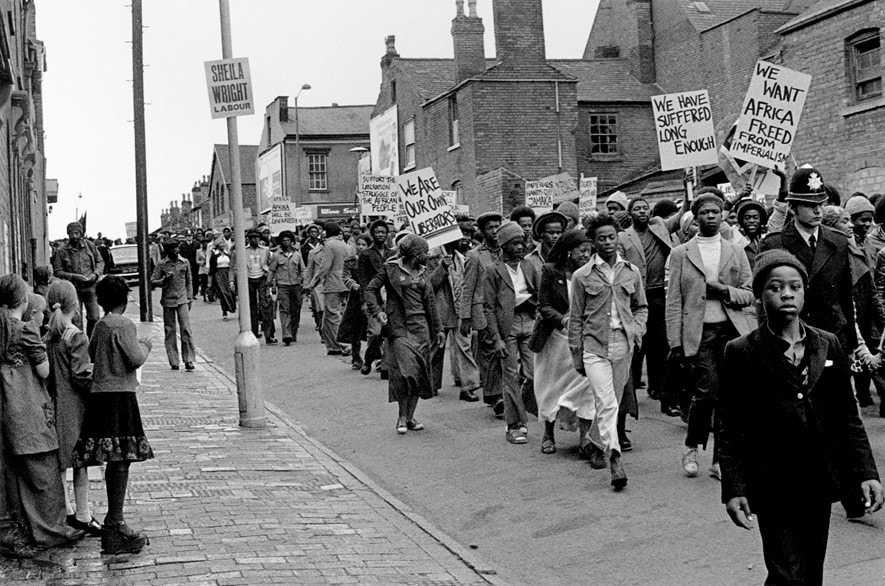|
|
Handsworth and the production of knowledge: Blackness, racism and anti-imperialism in 1970s Britain27/11/2019
The African Caribbean Self-Help Organisation (ACSHO), based at Heathfield Road in Handsworth, Birmingham, established itself as a central hub for Pan-African centred learning and intellectual debate in the early 1970s. ACSHO members were part of a UK-wide co-ordinating committee that sent a delegation of activists to the 6th Pan African Congress (6PAC) in Dar es Salaam, Tanzania in 1974. My Identities article, ‘Each one teach one’ visualising Black intellectual life in Handsworth beyond the epistemology of ‘white sociology’, shows how the conference statement by the UK delegation at the 6PAC meeting was critical of the inherent racism of their social condition in England’s metropolitan cities as well as of the racist ways they were being studied by white social scientists at the time. Through their own Pan-African centred and anti-colonial critique, the delegation used ‘scientific socialism’ to situate their political struggle within a global context of anti-imperialist resistance movements.
Inside this hive of Black intellectual activism emanating from Birmingham, the archival work of Vanley Burke is particularly noteworthy. Born in St Thomas, Jamaica in 1951, Burke recalls receiving a gift of a camera sent by his mother from England for his 10th Birthday. He became fascinated by the ‘magic of photography’ and was compelled by both the science and artistry of this medium (Sealy 1993). Since the early 1970s, Burke has documented the lives of Caribbean communities in Birmingham with an intimacy and sensitivity towards the people he shares the city with.
Burke’s photographs depict Black people going about their daily lives, visually contesting the dominant Eurocentric colonial gaze of the period as evident in the mainstream British press of the time. Birmingham’s Caribbean communities had developed a rich and varied political engagement with Black intellectual thought through music, faith and forms of community activism. Burke’s archive reflects the influence of Rastafari amongst young people, and shows how this philosophy and worldview was part of a spectrum of political ways of knowing including Black nationalism, Black Power consciousness, Black theologies, Pan-African and anti-imperialist schools of thought.
My Identities article shows how Burke’s archive allows us to see and understand Handsworth as a contested epistemic space where African Caribbean community organisations including ACSHO created their own sites of self-learning and self-education outside of mainstream formal state education. Burke’s photography and his wider archive collection provides a rich and nuanced visual insight into the intellectual circuits that existed in the homes, parks, streets, pubs, church halls, barbershops, hairdressers, sound-systems, radio stations, community centres, bookshops and community organisations of Black Birmingham. The article further situates histories of anti-imperialist self-learning in Handsworth amongst other disputed bodies of knowledge produced within the local and national press, and within the British academy about the neighbourhood. The national press and the academy often functioned as echo chambers that underscored nationalistic forms of racism and the problematic epistemic whiteness of ‘race-relations’ sociology. The featured photographs in the article provide an insight into contested ‘Handsworth epistemologies’ not only through the self-learning activities of African Caribbean residents but also through the ways in which Burke’s images show sociologists such as Stuart Hall, John Rex and Sally Tomlinson doing their own everyday academic and sociological work in Birmingham. I use Burke’s photography to place these intellectual constituencies into conversation in ways that work to visualise aspects of what Hall et al. (2013) called ‘the colony society’ in Policing the Crisis. This approach is taken to underscore how particular forms of Black intellectual activism were central to theorising the whiteness of ‘race relations sociology’, as well as to show how Black people in Birmingham were making their own anti-imperialist epistemologies within their everyday lives under the spectre of racism in Britain. References: Hall, S., C. Critcher, T. Jefferson, J. Clarke & B. Roberts. 2013. Policing the crisis: mugging, the State, and law and order. 2nd edn. Basingstoke: Palgrave Macmillan. Sealy, M. 1993. Vanley Burke: a retrospective. London: Lawrence & Wishart.
Blog post by Lisa Amanda Palmer, De Montfort University, UK
Read the full article: Palmer, Lisa Amanda. ‘Each one teach one’ visualising Black intellectual life in Handsworth beyond the epistemology of ‘white sociology’. Identities: Global Studies in Culture and Power. DOI: 10.1080/1070289X.2019.1648712
0 Comments
Your comment will be posted after it is approved.
Leave a Reply. |
|
Explore Identities at tandfonline.com/GIDE |
|
The views and opinions expressed on The Identities Blog are solely those of the original blog post authors, and not of the journal, Taylor & Francis Group or the University of Glasgow.

